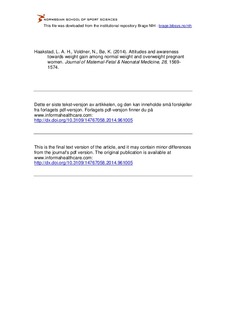| dc.contributor.author | Haakstad, Lene Annette Hagen | |
| dc.contributor.author | Voldner, Nanna | |
| dc.contributor.author | Bø, Kari | |
| dc.date.accessioned | 2015-10-27T10:29:57Z | |
| dc.date.available | 2015-10-27T10:29:57Z | |
| dc.date.issued | 2014-09-26 | |
| dc.identifier.citation | Journal of Maternal-Fetal & Neonatal Medicine. 2015, 28, 1569-1574 | nb_NO |
| dc.identifier.uri | http://hdl.handle.net/11250/2358084 | |
| dc.description | I Brage finner du siste tekst-versjon av artikkelen, og den kan inneholde ubetydelige forskjeller fra forlagets pdf-versjon. Forlagets pdf-versjon finner du på www.tandfonline.com: http://dx.doi.org/10.3109/14767058.2014.961005 / In Brage you'll find the final text version of the article, and it may contain insignificant differences from the journal's pdf version. The definitive version is available at www.tandfonline.com: http://dx.doi.org/10.3109/14767058.2014.961005 | nb_NO |
| dc.description.abstract | Objectives: (1) To evaluate the proportion who correctly classify- or misclassify maternal weight gain; (2) to investigate weight gain attitudes, and (3) to compare weight gain attitudes with weight gain recommendations by the Institute of Medicine (IOM), as well as background and lifestyle factors.
Methods: This is secondary analysis of cohort data collected as part of a prospective study of determinants of macrosomic infants in Norway (the STORKproject). The participants (n = 467) answered a self-administered questionnaire, including report on maternal weight gain and attitudes towards weight gain, in mean gestation week 36.4 (SD = 1.7). The women were also weighted (kg) at the hospital using a digital beam scale.
Results: A significant discrepancy was found between self-reported and measured maternal weight gain. About 76% reported to be satisfied with maternal weight gain while 24% were dissatisfied. Women reporting to be dissatisfied were significantly more likely to be sedentary, sick-listed, reporting poor eating habits and to be multiparous.
Conclusions: Most women reported to be satisfied with their maternal weight gain, but had gained excessively according to recommended weight gain ranges issued by IOM. Pregnant women may need targeted advice on their specific weight gain and impact of increased weight gain on health variables for mother and child. | nb_NO |
| dc.language.iso | eng | nb_NO |
| dc.publisher | Taylor & Francis | nb_NO |
| dc.subject | body mass index (BMI) | nb_NO |
| dc.subject | excessive gestational weight gain | nb_NO |
| dc.subject | institute of medicine (IOM) | nb_NO |
| dc.subject | maternal health | nb_NO |
| dc.subject | obesity | nb_NO |
| dc.subject | pregnancy | nb_NO |
| dc.title | Attitudes and awareness towards weight gain among normal weight and overweight pregnant women | nb_NO |
| dc.type | Journal article | nb_NO |
| dc.type | Peer reviewed | nb_NO |
| dc.subject.nsi | VDP::Medical disciplines: 700::Clinical medical disciplines: 750 | nb_NO |
| dc.source.journal | Journal of Maternal-Fetal & Neonatal Medicine | nb_NO |
| dc.description.localcode | Seksjon for idrettsmedisinske fag / Department of Sports Medicine | nb_NO |
